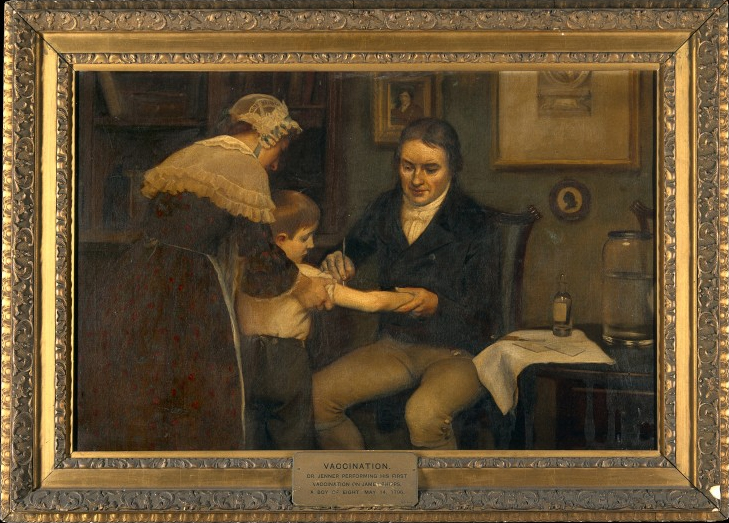Humanity has achieved countless medical breakthroughs over the centuries, yet few have had as profound and lasting impact as the invention of the first vaccine. A vaccination is the process of administering biological preparation called a vaccine to stimulate the immune system and protect individuals from infectious diseases. The primary purpose of the vaccine is to mimic the infection without causing the disease, although sometimes mild symptoms will occur for a brief period of time. This will prime the immune system to recognize and respond effectively later if the person is exposed to the actual infection.
This remarkable achievement was first performed by the English physician Edward Jenner in 1796. Despite recent controversies over vaccinations, this medical breakthrough had led to the prevention of many diseases and has undoubtedly saved countless lives.
Edward Jenner and the Smallpox Threat
This first vaccination was developed against smallpox, a disease that had plagued humanity for thousands of years. This highly contagious and often fatal disease caused high fever, severe skin rashes, and the formation of fluid-like blisters on the skin. Smallpox had a mortality rate of up to 30%. Outbreaks were common, leading to the loss of millions of lives. Edward Jenner, an English physician and scientists, made his revolutionary discovery late in the 18th century when he developed a vaccine for smallpox.
Earlier in the 18th century it was observed that people who suffered from a more benign form of cowpox became immune to smallpox. Jenner had also observed that milkmaids who had contracted and subsequently recovered from cowpox did not appear to contract smallpox. These observations led Jenner to hypothesize that the cowpox infections somehow helped to protect these people against smallpox. In 1796 Jenner tested his hypothesis. He took cowpox material from Sarah Nelmes, a milkmaid, and injected it into the arm of an eight year old boy, James Phipps. The boy became sick for a few days but soon recovered. Two months later he was exposed to smallpox and showed immunity to the disease, which lasted for the rest of his life. It was the proof Jenner was needed. He had successfully developed worlds the first vaccination, the word derived from the Latin word vacca, which means cow.
Two years later Jenner published An Inquiry into the Causes and Effects of the Variolae Vacciniae, which outlined Phipps vaccination as well as twenty two related cases. Jenner’s publication soon generated much interest on the topic after subsequent vaccinations were reproduced by others. His work laid the foundation for the science of immunology, leading the development of vaccines for many other diseases. Over the coming decades advancements in microbiology and immunology led to the development of vaccines for several diseases, including polio, influenza, measles, mumps, rubella, HPV, and many others.
Most recently the COVID-19 pandemic, caused by the SARS-Cov-2 virus, highlighted the need for vaccines. In a remarkably short time multiple vaccines were developed and authorized for emergency use to combat the pandemic. Governments launched vaccination campaigns globally to control the spread of the disease and reduce its impact on the public health.
A Long-Lasting Global Impact
Jenner’s discovery of the vaccination was nothing short of revolutionary. Within a few years vaccinations spread around the world and were being endorsed by governments. As early as 1801 Russia supported the use of vaccinations and in 1802 Massachusetts became the first state to actively support their use as well. Today vaccinations provide a variety of public health benefits. These benefits include:
- Disease Prevention: The primary purpose of vaccines is disease prevention. They work by stimulating the immune system to recognize and fight specific pathogens, reducing the likelihood of infection.
- Reduced Morbidity and Mortality: Vaccines reduce the incidence of diseases, hospitalizations, and deaths. Additionally, after a large enough portion of the population is vaccinated, herd immunity is achieved, protecting even those who have not been vaccinated.
- Elimination of Diseases: Vaccinations have played a paramount role in the elimination or near elimination of many diseases, beginning with smallpox. In 1980, the world was officially declared free from this deadly disease. Polio is another disease on the verge of elimination.
- Various Economic Benefits: By preventing illnesses, vaccines reduce healthcare costs associated with treating infectious diseases. They also minimize lost productivity due to illness in the workplace.
- Prevention of Outbreaks: Vaccines are critical in preventing outbreaks of infectious diseases.
It is because of these and numerous other benefits that vaccines are considered one of the most successful and cost-effective public health measures.
Continue reading more about the exciting history of science!
